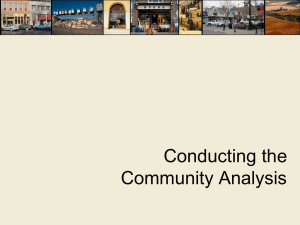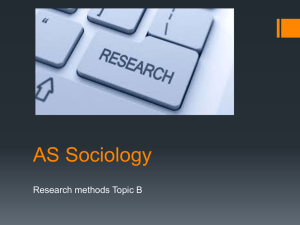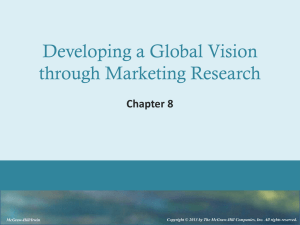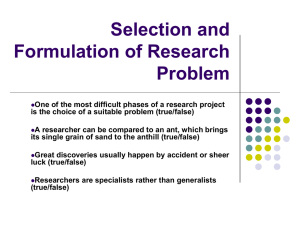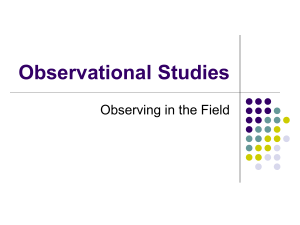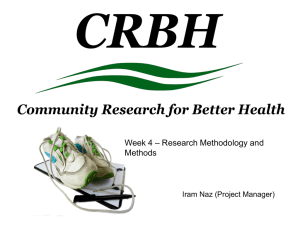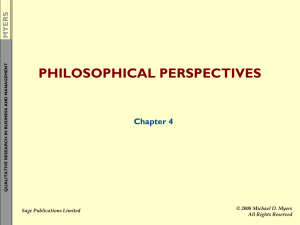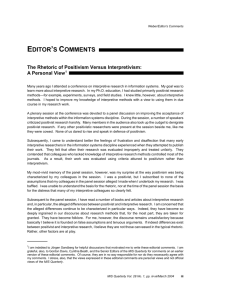Paradigms & Qual Research
advertisement
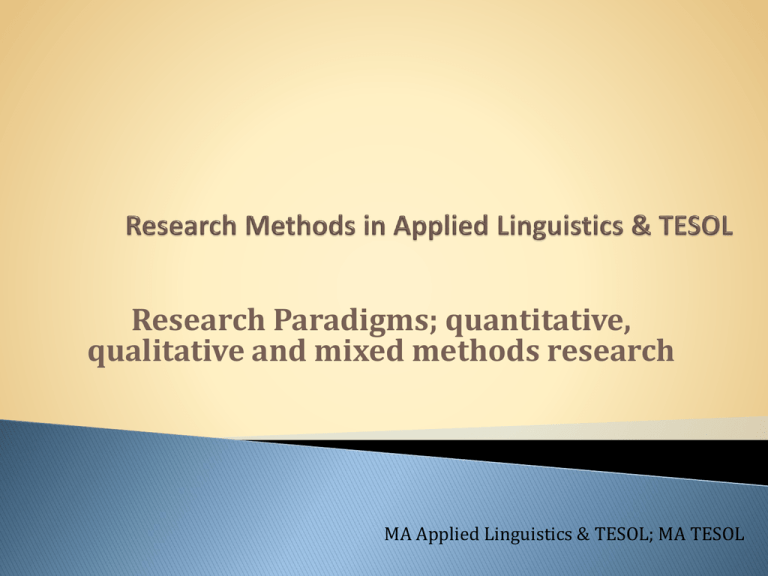
Research Paradigms; quantitative, qualitative and mixed methods research MA Applied Linguistics & TESOL; MA TESOL “A set of basic beliefs (or metaphysics) … It represents a world view that defines, for its holder, ◦ the nature of the ‘world’, ◦ the individual ’s place in it, and ◦ the range of possible relationships to that world and its parts… The beliefs are basic in the sense that they must be accepted simply on faith; there is no way to establish their ultimate truthfulness.” (Guba & Lincoln, 1994:107) “frameworks that function as maps or guides for scientific communities, determining important problems or issues for it members to address and defining acceptable theories or explanations, methods and techniques to solve defined problems.” (Usher 1996:15) Do the beliefs of researchers (i.e. the scientific communities) in Physics, Philosphy, English Literature, Education, and Applied Linguistics & TESOL differ? Beliefs can be about Ontology and Epistemology The nature of reality, what is, and what can be known about it REALIST: the world out there is real, and can be studied and understood to identify the rules that govern behaviour RELATIVIST: there is no single reality independent of our ways of understanding it The nature of knowledge, and the relationship between knower and known “the study of how knowledge is constructed about the world, who constructs it, and what criteria they use to create meaning and methodology” (Usher, 1996, p. 131) OBJECTIVIST: truth is accessible, and it is possible to establish general truths and laws SUBJECTIVIST: knowledge is created through interaction between the world and the individual, and we can explore this relationship to understand how the world is interpreted and understandings are constructed. Based on their beliefs, researchers choose paradigm: ◦ ◦ ◦ ◦ ◦ Positivism Constructivism (Interpretivism) Critical Research (post-positivism) Feminism Pragmatism “…scientists test claims. They test them by making predictions about the world, which they try to confirm or disconfirm by experiment and observation. They try to increase the accuracy of those experiments and observations by devising new methods and instruments.” (Gregg: 2000:389) The researcher is an observer Knowledge is ‘hard’, ‘real’, & can be transmitted in tangible form People are regarded collectively Human behaviour is rule-governed The researcher considers that what s/he writes represents what s/he observes – a transparent description that reflects the world. The researcher considers him/herself objective and neutral, and his/her knowledge value-free Causation is important: it lies in the past Certainty and control are important [For a summary of positivism v. interpretivism, go to slide 22.] People are studied in terms of how they ‘behave’ Research methods are those of the natural science Data is obtained by surveys, tests and experiments Relationships and regularities are analyzed quantitatively (e.g. statistically) The researcher likes to predict (e.g. cause and effect) The researcher derives universal laws or generalizations and explains by showing how things in the world correspond with these laws/generalizations depersonalising / dehumanising a mechanistic and reductionist conception of nature which excludes choice, freedom, moral responsibility... restricts, simplifies and controls a complex reality to the point where its findings are no longer useful sense-data / observations are not theory-free... data and its interpretation are not separate Interpretation and understanding of social meanings is mediated through language, which is neither transparent nor a mirror, but opaque and constitutive “... in studying social realities we are not dealing with a reality made up of ‘brute fact’ or a reality of external ‘thing-like’ forces and objects, but one that is intersubjectively constituted by persons relating to each other through practices identified and given meaning by the language used to describe them, invoke them, and carry them out” (Hughes, p117) In pure positivist research, the scientific method involves experimentation, with the use of a control group. This approach is rarely taken in educational research where the approach is more likely to be quasiexperimental. Experimentation almost always raises ethical issues in educational research: "The essential feature of experimental research is that investigators deliberately control and manipulate the conditions which determine the events in which they are interested." (Cohen & Manion, 1994: 164) Most social science and educational research is postpositivist rather than purely positivist. accepts and tries to address some of the criticisms of crude positivism recognises that reality can only be imperfectly understood relies on the possibility of falsification. "The principal concern is with an understanding of the way in which the individual creates, modifies and interprets the world in which he or she finds himself or herself." (Cohen and Manion, 1994, p. 8) "the task of the social scientist should not be to gather facts and measure how often certain patterns occur, but to appreciate the different constructions and meanings that people place upon their experience." (Easterby-Smith et al, 1994, p.78) "the world and 'reality' are not objective and exterior, but …are socially constructed and given meaning by people." (Easterby-Smith, et al, 1994, p. 78) It is assumed that all human action is meaningful, “and hence has to be interpreted and understood within the context of social practices.” (Usher, 1996, p.18) Knowledge is ‘soft’, subjective, and based on experience and insight derived from studying actors in particular, natural settings The researcher is involved, engaged with the site in which she is working, and may be transformed by the experience The researcher tells stories about the worlds s/he has studied Data is obtained by participant observation, personal accounts, semi-structured interviews... The data is analysed qualitatively to understand how people create, modify and interpret the world The unique and particular, and the individual is valued The researcher wants to understand the subjective world of human experience from within Human beings are active creators of knowledge, and reality as inter-subjectively constituted and shared, within a historical, political and social context. The researcher does not primarily look for cause and effect The researcher is interested in actions, assumptions and meanings beneath the texture of everyday life Theory emerges from particular situations, grounded in particular data Methods are multiple, triangulated, to find a solution to a concrete situation, to secure a deep understanding Qualitative research is multi-method in focus, involving an interpretive, naturalistic approach to its subject matter. This means that qualitative researchers study things in their natural settings, attempting to make sense of, or interpret, phenomena in terms of the meanings people bring to them. Qualitative research involves the studied use and collection of a variety of empirical materials – case study, personal experience, introspective, life story, interview, observational, historical, interactional, and visual texts – that describe routine and problematic moments and meanings in individuals’ lives. Accordingly, qualitative researchers deploy a wide range of unconnected methods, hoping always to get a better fix on the subject matter at hand. (Denzin & Lincoln, 1994:2) The individuals’ own perspectives are not to be trusted (they are not objective) Individual perspectives are partial - they still have to be knit together into an explicit and comprehensive body of knowledge If we abandon scientific procedures of verification, and give up hope of making generalisations, then do we not start writing literature, or biography, or journalism? Meanings and interpretations may be the product of the circumstances and the power of others to impose their own meanings. We need to move beyond the individuals’ interpretation towards a theoretical explanation of behaviour POSITIVIST INTERPRETIVE The world is external and objective The world is socially constructed and subjective The observer is independent The observer is part of what is observed Science is value free Science is driven by humaninterests The focus is on facts The focus is on meanings Search for causality Try to understand what is happening Reduce to simplest elements Look at the totality of the situation Formulating concepts for measurement Using multiple methods to establish different views of the phenomena Large samples Small samples looked at in depth or over time. (adapted from Easterby-Smith, 1994, p. 80): NORMATIVE (Positivist) INTERPRETIVE Society and the social system The individual Medium/large scale research Small scale research Natural science model Non-statistical ‘Objectivity' ‘Subjectivity' Researcher is 'outside' Researcher is personally involved Generalizations from the specific Interpretations of the specific Explaining behaviour Understanding actions Seeking causes Meanings rather than causes (after Cohen and Manion, 1994, p. 39) In practice, researchers often adopt a model that is a combination of approaches, for example, both quantitative &positivist and qualitative & interpretive. "a growing body of social research takes a stand somewhere between the two schools of thought. It is recognised that no piece of social research can be entirely objective, since no researcher is value free. Even in an overtly rigorous quantitative, head-counting study, some implicit decisions have already been made as to which heads are worth counting." (Johnson, 1994, p. 7) See the mixed methods research literature by Berman (2008), Creswell (2008), Cresswell & Clark (2007), and Tashakkori & Teddlie (1998, 2003). The possibilities are practically endless, but mixed methods studies in education might include, for example: A questionnaire survey with a large sample, plus a few individual interviews, plus a few classroom observations OR Diaries, interviews and observations, all from/of the same, small number of participants OR Some kind of text analysis (e.g. conversation analysis, interaction analysis, critical discourse analysis) with focus group discussion data and field notes. Which is the right paradigm and which are the right methods for you depends on ◦ Your personal stance and ◦ Your research questions Do you spontaneously sympathize more with one paradigm than the other? Are you more of an interpretivist, or a positivist? How do you think you will best gain an understanding of you research topic/ answers to your research questions – by using mainly qualitative or quantitative methods? The third type of research tradition, Critical Theory, is ‘emancipatory’, a critique of ideology implying the taking of action to change situations. In this theory there can be no “objective” knowledge since every view is influenced by a social interest. Feminist research relates to critical theory since it implies a commitment to change. Includes: Critical Ethnography, Feminism, Critical Pedagogy, Critical Discourse Analysis Critical approaches are distinguished from interpretative approaches primarily by their connection to theoretical perspectives which are linked to a general theory of society and a concept of social structure which exists beyond the actor’s perception of it. Masemann (1982), in Lather (1991) Overcoming oppression Knowledge comes from self-reflection, and is concerned with values and standards Emancipation through enlightenment, by enabling members of oppressed groups to recognise their interests, free themselves of ideology, and gain control over their own lives. Validity of a critical theory is measured by its ability to enlighten and foster personal autonomy. Heigham, J. & Croker, R. A. (Eds.) (2009). Qualitative research in applied linguistics. A practical introduction. Basingstoke, Palgrave Macmillan. (Available as e-book.) Dörnyei, Z. (2007) Research methods in applied linguistics : quantitative, qualitative, and mixed methodologies. Oxford : Oxford University Press (Multiple hard copies available.) Kendall, A. King &Nancy H. Hornberger (Eds.) (2008). Encyclopedia of language and education, Vol.10: Research methods in language and education. New York, N.Y., Springer. (Available as e-book.) Cohen, L., Manion, L. & Morrison, K. (2002) Research Methods in Education 5th Edition. Routledge Cresswell, J. W. and V. L. P. Clark (2007). Designing and conducting mixed methods research. London, Sage
